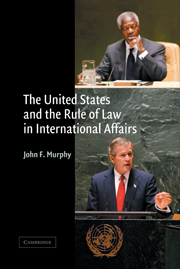Book contents
- Frontmatter
- Contents
- Acknowledgments
- Introduction
- 1 Law and legal process in international affairs
- 2 The status of international law under US law
- 3 UN dues
- 4 Use of force
- 5 Arms control, disarmament, nonproliferation, and safeguards
- 6 The law of the sea
- 7 The International Court of Justice
- 8 Prevention, prosecution, and punishment of international crimes
- 9 Human rights and international environmental issues
- 10 Summary and conclusions, and some possible future scenarios
- Index
6 - The law of the sea
Published online by Cambridge University Press: 22 September 2009
- Frontmatter
- Contents
- Acknowledgments
- Introduction
- 1 Law and legal process in international affairs
- 2 The status of international law under US law
- 3 UN dues
- 4 Use of force
- 5 Arms control, disarmament, nonproliferation, and safeguards
- 6 The law of the sea
- 7 The International Court of Justice
- 8 Prevention, prosecution, and punishment of international crimes
- 9 Human rights and international environmental issues
- 10 Summary and conclusions, and some possible future scenarios
- Index
Summary
The law of the sea is a subject of quite extraordinary breadth and depth, and this chapter makes no pretense at exhaustive coverage. It is a field of international law, however, that the United States has played a major role in developing, yet currently remains unwilling to ratify a comprehensive convention on the subject. The history of US policy on the law of the sea provides some excellent examples of its ambivalent attitude toward adhering to the rule of law in international affairs.
As noted recently by some eminent authorities, “The Law of the Sea is commonly used to describe that part of international law that deals with the relations, activities and interests of states involving the sea.” So described, the law of the sea must be distinguished from other branches of the law relating to the sea – such as admiralty or maritime law – that primarily involve the relations, activities, and interests of private persons participating in the transport by sea of passengers or goods. These branches are primarily though not exclusively governed by the domestic law of states.
Until the middle of the twentieth century the law of the sea was largely customary law, and constituted a relatively stable legal system. Under this legal system, “vast areas of the oceans – the high seas – [were] generally regarded as common space, not subject to the sovereignty or exclusive control of any state.
- Type
- Chapter
- Information
- The United States and the Rule of Law in International Affairs , pp. 226 - 249Publisher: Cambridge University PressPrint publication year: 2004



